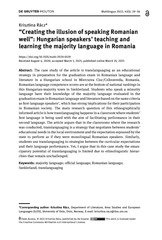„Creating the Illusion of Speaking Romanian Well”: Hungarian Speakers’ Teaching and Learning the Majority Language in Romania
Чланак у часопису (Објављена верзија)
Метаподаци
Приказ свих података о документуАпстракт
The case study of the article is translanguaging as an educational
strategy in preparation for the graduation exam in Romanian language and
literature in a Hungarian school in Miercurea Ciuc/Csíkszereda, Romania.
Romanian language competence scores are at the bottom of national rankings in
this Hungarian-majority town in Szeklerland. Students who speak a minority
language have their knowledge of the majority language evaluated in the
graduation exam in Romanian language and literature based on the same criteria
as first-language speakers’, which has strong implications for their participation
in Romanian society. The main research question of this ethnographically
informed article is how translanguaging happens in a classroom where students’
first language is being used with the aim of facilitating performance in their
second language. The article argues that in the classrooms where the research
was conducted, translanguaging is a strategy that negotiates between students’
...
educational needs in the local environment and the expectation espoused by the
state to perform as if they were monolingual Romanian speakers. Similarly,
students use translanguaging to strategize between the curricular expectations
and their language performance. Yet, I argue that in this case study the emancipatory potential of translanguaging is limited due to ethnolinguistic hierarchies that remain unchallenged.
Кључне речи:
majority language / official language / Romanian language / Szeklerland / translanguagingИзвор:
Multilingua: Journal of Cross-Cultural and Interlanguage Communication, 2022, 41, 1, 29-56Издавач:
- De Gruyter Mouton
Финансирање / пројекти:
- https://www.hf.uio.no/ilos/english/research/projects/probing-the-boundaries-of-the-transnational/index.html
Колекције
Институција/група
IFDTTY - JOUR AU - Racz, Krisztina PY - 2022 UR - http://rifdt.instifdt.bg.ac.rs/123456789/2577 AB - The case study of the article is translanguaging as an educational strategy in preparation for the graduation exam in Romanian language and literature in a Hungarian school in Miercurea Ciuc/Csíkszereda, Romania. Romanian language competence scores are at the bottom of national rankings in this Hungarian-majority town in Szeklerland. Students who speak a minority language have their knowledge of the majority language evaluated in the graduation exam in Romanian language and literature based on the same criteria as first-language speakers’, which has strong implications for their participation in Romanian society. The main research question of this ethnographically informed article is how translanguaging happens in a classroom where students’ first language is being used with the aim of facilitating performance in their second language. The article argues that in the classrooms where the research was conducted, translanguaging is a strategy that negotiates between students’ educational needs in the local environment and the expectation espoused by the state to perform as if they were monolingual Romanian speakers. Similarly, students use translanguaging to strategize between the curricular expectations and their language performance. Yet, I argue that in this case study the emancipatory potential of translanguaging is limited due to ethnolinguistic hierarchies that remain unchallenged. PB - De Gruyter Mouton T2 - Multilingua: Journal of Cross-Cultural and Interlanguage Communication T1 - „Creating the Illusion of Speaking Romanian Well”: Hungarian Speakers’ Teaching and Learning the Majority Language in Romania IS - 1 VL - 41 SP - 29 EP - 56 DO - 10.1515/multi-2020-0129 ER -
@article{
author = "Racz, Krisztina",
year = "2022",
abstract = "The case study of the article is translanguaging as an educational
strategy in preparation for the graduation exam in Romanian language and
literature in a Hungarian school in Miercurea Ciuc/Csíkszereda, Romania.
Romanian language competence scores are at the bottom of national rankings in
this Hungarian-majority town in Szeklerland. Students who speak a minority
language have their knowledge of the majority language evaluated in the
graduation exam in Romanian language and literature based on the same criteria
as first-language speakers’, which has strong implications for their participation
in Romanian society. The main research question of this ethnographically
informed article is how translanguaging happens in a classroom where students’
first language is being used with the aim of facilitating performance in their
second language. The article argues that in the classrooms where the research
was conducted, translanguaging is a strategy that negotiates between students’
educational needs in the local environment and the expectation espoused by the
state to perform as if they were monolingual Romanian speakers. Similarly,
students use translanguaging to strategize between the curricular expectations
and their language performance. Yet, I argue that in this case study the emancipatory potential of translanguaging is limited due to ethnolinguistic hierarchies that remain unchallenged.",
publisher = "De Gruyter Mouton",
journal = "Multilingua: Journal of Cross-Cultural and Interlanguage Communication",
title = "„Creating the Illusion of Speaking Romanian Well”: Hungarian Speakers’ Teaching and Learning the Majority Language in Romania",
number = "1",
volume = "41",
pages = "29-56",
doi = "10.1515/multi-2020-0129"
}
Racz, K.. (2022). „Creating the Illusion of Speaking Romanian Well”: Hungarian Speakers’ Teaching and Learning the Majority Language in Romania. in Multilingua: Journal of Cross-Cultural and Interlanguage Communication De Gruyter Mouton., 41(1), 29-56. https://doi.org/10.1515/multi-2020-0129
Racz K. „Creating the Illusion of Speaking Romanian Well”: Hungarian Speakers’ Teaching and Learning the Majority Language in Romania. in Multilingua: Journal of Cross-Cultural and Interlanguage Communication. 2022;41(1):29-56. doi:10.1515/multi-2020-0129 .
Racz, Krisztina, "„Creating the Illusion of Speaking Romanian Well”: Hungarian Speakers’ Teaching and Learning the Majority Language in Romania" in Multilingua: Journal of Cross-Cultural and Interlanguage Communication, 41, no. 1 (2022):29-56, https://doi.org/10.1515/multi-2020-0129 . .



